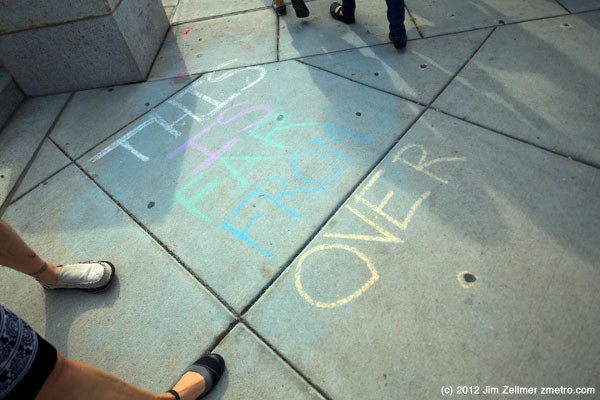Why has the mainstream US media failed to get past the rhetoric of political ads during this presidential campaign?
Political ads rarely tell the truth and in this year’s election campaign, facts have tended to matter less. This is where mainstream media should step up.
But so far, the US media have not shown the appetite or the stomach to get past the rhetoric and get to the truth. In this week’s News Divide, we look at the politics of telling the truth in a heated election campaign.
Google: The Case for Hawkish Regulation
Google reminds me of Adam, the cute, 100-foot-tall toddler in the 1992 Rick Moranis film, Honey I Blew Up the Kid. In case you missed it, Adam keeps stumbling over buildings, mistakes real cars for toys, and ultimately threatens the existence of Las Vegas. Adam is also the name of the errant father of the human race. And Google is the company named after an astronomically large number (1 with a hundred zeros after it) that controls access to most of the information on earth and that finds innovative new ways to get in trouble several times a year.
In 2010, Google’s Street View teams – the mobile crews that are systematically filming every street and building in the world, including your home – were accused of deliberately capturing people’s names, telephone numbers, emails, text messages, passwords, search histories, and even online dating information as they drove from neighbourhood to neighbourhood in the US and more than 30 other countries between 2006 and 2010. Google snatched the data from Wi-Fi networks. This is akin to what those nasty adults in the white van were doing when they drove around the neighborhood trying to find ET, but on a spectacular scale.
Regional US Sandwich Guide
Clash of the Archetypes
AS POLITICS has become more scripted over the decades, journalists have begun to sound like critics, discussing campaigns in terms of “memes” and “narratives.” Contests are analyzed on aesthetic grounds almost as though they are movies or Broadway shows. This summer, with Obama versus Romney still in previews, a consensus emerged among the critics that remains largely unchallenged: The show is a flop, a stupefying spectacle of triviality and negativity that may as well be titled Numb and Number. Under the headline, “Dullest Campaign Ever,” The New York Times’ David Brooks blamed “tit-for-tat” Web feuds, “ossified” ideologies, and ads directed at the “uninformed.” Peggy Noonan, in another pan, pinned the race’s alleged “lack of passion” on candidates wanting in “political genius.”
The problem with treating politics as stagecraft, particularly this year, is that it mistakes the production for the play and confuses theater with drama. Theater is shallow, drama deep. And it’s at the dramatic level that this campaign is singularly engrossing. Down in the catacombs of the group unconscious where elections really occur, where the spotlights don’t reach, and where the polls can barely penetrate, a mythological struggle is unfolding between two profoundly different archetypal figures: a lost boy who knew his father largely in dreams and grew up bedeviled by questions of identity, and a favorite son whose father’s support freed him from having to question much of anything. Barack Obama, a lonely meritocratic floater whose searcher parents met while on the drift and then wafted off in separate directions, fashioned a self from thin air; while Mitt Romney, from a family of pioneers who’d safely reached the promised land, hit the ground already in position.
From 0 to 100 years in 150 seconds: Amsterdam
Vinod Khosla says technology will replace 80 percent of doctors — sparks indignation
Accomplished Silicon Valley investor Vinod Khosla likens modern healthcare to witchcraft, and says technology will replace 80 percent of doctors.
His views, offered up in a talk last week in San Francisco, sparked outrage from doctors.
Khosla is a co-founder of Sun Microsystems, and made his mark as one of the most successful investors during the Internet boom of the late 1990s with his backing of networking equipment companies.
He made the healthcare comments during the Health Innovation Summit, hosted by Rock Health, a seed accelerator company focused on health care. Khosla’s keynote talk is nicely summarized by Davis Liu, a doctor who attended the event.
In his comments, Khosla said that medical tradition has mired doctors in voodoo-like practices.
Khosla said that machines, driven by large data sets and computations power, not only would be cheaper, more accurate and objective, but better than the average doctor. To get there, the level of machine expertise would need to be in the 80th percentile of doctors’ expertise, he said.
And then Khosla slipped in some hyperbole: “Eventually, we won’t need the doctor,” he said, according to another report of the talk.
The audience reportedly went silent when Khosla challenged anyone to disagree with him. However, after the talk, critics reading about his talk took to comments at the bottom of Liu’s piece, and elsewhere, including Twitter. Columbia University-trained doctor Bijan Salehizadeh said he was “nauseated” by Khosla’s remarks.
Khosla also upset some doctors by saying that disruption in healthcare is likely to be driven by entrepreneurs outside of the industry, rather than by specialists within.
Organic food no healthier than non-organic: study
Organic produce and meat typically isn’t any better for you than conventional varieties when it comes to vitamin and nutrient content, according to a new review of the evidence.
But organic options may live up to their billing of lowering exposure to pesticide residue and antibiotic-resistant bacteria, researchers from Stanford University and the Veterans Affairs Palo Alto Health Care System found.
“People choose to buy organic foods for many different reasons. One of them is perceived health benefits,” said Dr. Crystal Smith-Spangler, who led the new study.
“Our patients, our families ask about, ‘Well, are there health reasons to choose organic food in terms of nutritional content or human health outcomes?'”
Saturday Madison Photos: Raging Grannies, Old Chevy, Tammy & Tommy, Ayn Rand, “This is Far from Over”

The Raging Grannies performed “Drones in the Sky” among other tunes.



I saw a number of Tammy and Tommy stickers. Two men sporting Tommy stickers walked briskly by as I purchased tomatoes. They encouraged each other to move quickly as the “Tammy people were on this corner”.
Everything You Think You Know About China Is Wrong Are we obsessing about its rise when we should be worried about its fall?
The disconnect between the brewing troubles in China and the seemingly unshakable perception of Chinese strength persists even though the U.S. media accurately cover China, in particular the country’s inner fragilities. One explanation for this disconnect is that elites and ordinary Americans remain poorly informed about China and the nature of its economic challenges in the coming decades. The current economic slowdown in Beijing is neither cyclical nor the result of weak external demand for Chinese goods. China’s economic ills are far more deeply rooted: an overbearing state squandering capital and squeezing out the private sector, systemic inefficiency and lack of innovation, a rapacious ruling elite interested solely in self-enrichment and the perpetuation of its privileges, a woefully underdeveloped financial sector, and mounting ecological and demographic pressures. Yet even for those who follow China, the prevailing wisdom is that though China has entered a rough patch, its fundamentals remain strong.
How Google and Apple’s digital mapping is mapping us
Which brings us to the core of the matter. It can be easy to assume that maps are objective: that the world is out there, and that a good map is one that represents it accurately. But that’s not true. Any square mile of the planet can be described in an infinite number of ways: in terms of its natural features, its weather, its socio-economic profile, or what you can buy in the shops there. Traditionally, the interests reflected in maps have been those of states and their armies, because they were the ones who did the mapmaking, and the primary use of many such maps was military. (If you had the better maps, you stood a good chance of winning the battle. The Ordnance Survey’s logo still includes a visual reference to the 18th-century War Department.) Now, the power is shifting. “Every map,” the cartography curator Lucy Fellowes once said, “is someone’s way of getting you to look at the world his or her way.” What happens when we come to see the world, to a significant extent, through the eyes of a handful of big companies based in California? You don’t have to be a conspiracy theorist, or an anti-corporate crusader, to wonder about the subtle ways in which their values and interests might come to shape our lives.